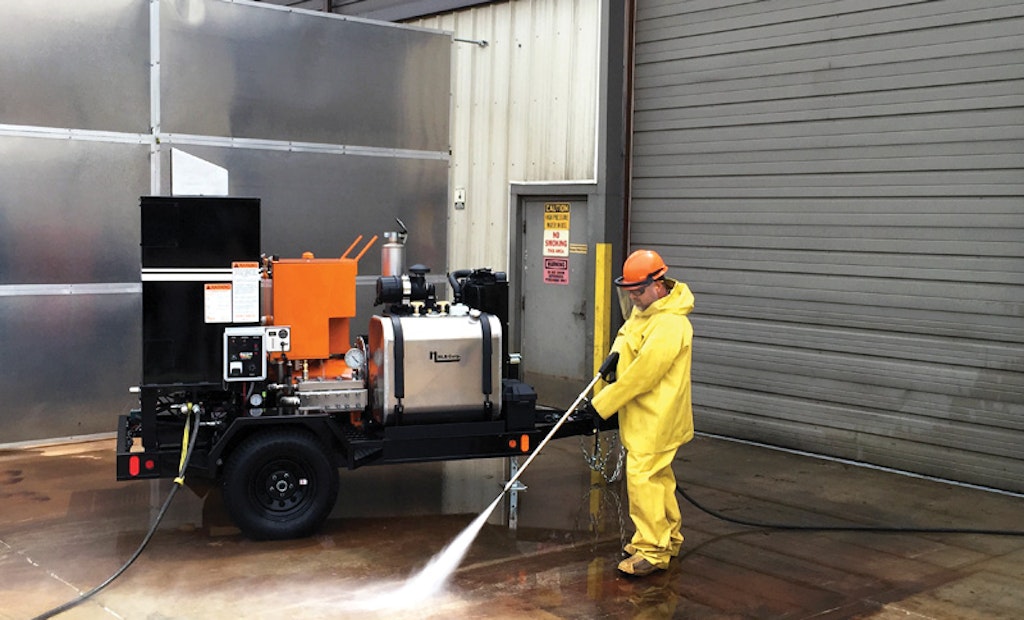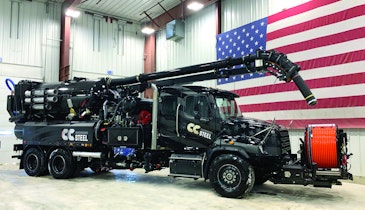
Interested in Cleaning?
Get Cleaning articles, news and videos right in your inbox! Sign up now.
Cleaning + Get AlertsOrchestrating a planned maintenance shutdown at a plant or factory involves a lot of moving parts as contractors move in and out to do their respective jobs. And amidst this organized chaos, no industrial cleaning outfit wants to be “that guy” — the company whose equipment breaks down, creating a domino effect of costly delays for the customer.
That’s rarely a concern for Chester Yeager, the operations manager and co-owner of Superior Environmental Solutions (SES) in Cincinnati. Within the last couple years, the company has invested in six 335DHW hot-water jetting washers — heavy-duty units from NLB Corp. that reliably operate under demanding conditions.
“We needed a dependable pressure washer that could hold up to the rigors of how we use them,” says Yeager, whose company offers a range of services that includes industrial vacuuming, pressure washing and hydroblasting. “During roughing outages (maintenance shutdowns), these units go in and run for up to 72 hours nonstop without breaking down. These machines fire up, run and do the job they’re meant to do.”
SES used to buy smaller pressure washers that cost about $4,000, plus another $4,000 for a trailer on which to mount them. That would appear to be relatively inexpensive compared to about $50,000 apiece for the NLB machines. But the smaller machines rarely lasted more than a year, while Yeager says he expects to get 15 to 20 years of use out of the NLB units.
“Sure, they’re more expensive up-front,” Yeager says. “But when you factor in the constant repurchasing and the downtime, the cost is negligible. Plus, it’s hard to put a price on an unhappy customer.”
Yeager says SES officials worked with NLB to develop a large pressure washer that was more like a hydroblaster, but capable of hot-water jetting and low-pressure, high-volume industrial cleaning. The result was the 335DHW, featuring a 66 hp Kubota diesel engine, a 50-gallon water tank, a triplex water pump (3,500 psi at 15 gpm) and a 700,000 Btu
burner unit.
The 335s also feature an unloader valve that maintains a constant supply of freshwater to the pump, which keeps water temperatures constant. That’s a big improvement from the smaller pressure washers SES used before. They recirculated the water, which got hotter and hotter as it was used, leading to pump wear.
Yeager also praises the units’ capability to run multiple spray guns simultaneously. It maintains 3,500 psi at 15 gpm, crews can run three 5 gpm guns or two 7 gpm guns at one time, which increases productivity. “It doesn’t triple production, but it at least doubles it,” he says. “We can clean plant floors much more quickly.”
At the same time, the 335s are more like hydroblasters because they can bust through difficult-to-remove material like tallow in meat-processing plants. Debris builds up in the bottom of tanks and becomes almost solid over time. But the 335s power through it, thanks to the high pressure and hot-water capability.
“It’s like a giant fist that just beats on it,” Yeager says. “We also use these machines to lance out lines in tallow plants. The hot water just melts the tallow right out of there and the water flow pushes it out.” The 335s even get used as small hydroexcavating units in locations where large hydroexcavating trucks won’t fit, he adds.
Yeager says the units’ dependability stems from their simple but sound engineering. That simplicity also makes it easy to train operators and maintain the units, he says.
The machines also help SES bid more competitively, thanks to the multi-gun capability. While other companies need, say, three pickup trucks to tow three power washers, SES can offer the same capabilities with just one truck. “It just makes things run a little smoother,” Yeager says. “And it never hurts to have some flexibility out there. If you plan on using just one gun, it never fails that a customer asks you to do another job while you’re there that requires two guns. And if you only have one gun, you have to wait to get another pressure washer from the shop. But we just plug in another gun and go.”
In the end, Yeager says the 335s’ most valuable attribute is their durability. Because they’re so reliable, SES can confidently tackle large jobs, like cleaning out a 1-million-gallon industrial tank. “You go into a tank that size and you’re going for a couple weeks straight,” he says. “But these machines get the job done.





